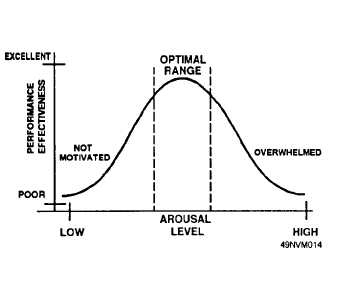| |
Goals
The very idea of goals causes many people to feel
stressed.
Having a written goal brings about the
possibility of failure. It is that fear of failure that can
lead to stress.
Externalized Job
Most of us in the Navy find a certain amount of
comfort in working with other Navy members. Most
young sailors have worked with other Navy personnel,
socialized with other Navy personnel, and many times
lived with or at least near other Navy personnel. Now
we tell them that their job is to talk to civilian
prospects, educators, parents, community leaders, and
so on. There is more stress when people must deal
with those outside of their organization.
Less Control
One of the most frequent causes of our stress on
recruiting duty is the feeling that we have less control
over our individual success than we would like. A
technician has control over the job of fixing a
component.
As long as the tools and parts are
available, it is totally up to the technician to
successfully complete the repair. Recruiters may feel
the control of their job is shared by the applicant, the
applicant’s parents, educators, District restrictions,
medical, and other factors.
If they were to do
everything just right, they still might not write a
contract.
This feeling of less control contributes
significantly to the level of stress, especially for type
A personalities, which we will discuss later.
THREE BASIC PREMISES OF STRESS
An industrial psychologist working with the Naval
Personnel Research and Development Center based his
stress management presentation on three basic
premises. These premises support his contention that
stress is the very thing that pushes us to successful
performance but can be detrimental if not well
managed. The following paragraphs explain these
premises and their relationship to job performance.
Premise Number One
“Adrenaline is the best friend a high achiever has,
provided it is well managed.” Adrenaline increases
our strength, speed, and endurance. People naturally
perform better when they get that extra surge of
adrenaline. Athletes will beat their practice records
when they enter a competition because of the
increased stress and adrenaline. It has even been
reported that a 100-pound woman lifted an automobile
to rescue her child.
The stress of the situation
triggered extra adrenaline that gave her physical
capabilities well above the norm.
RELATIONSHIP BETWEEN STRESS AND
PERFORMANCE. – We need to understand that stress
is a necessary ingredient for successful performance.
There is a definite relationship between stress and
performance. When individuals have too little stress
or arousal, they may be unmotivated. This state is
often referred to as “rust-out.” When there is too
much stress or arousal, the individual may become
overwhelmed. This we call “bum-out.” Our job is to
identify whether we need to increase the stress level
or alleviate it to maximize our people’s performance.
Figure 3-3 shows the relationship between stress and
performance.
INDIVIDUAL OPTIMAL LEVELS.– All
individuals have their own optimal level of stress or
arousal required for peak performance. It is important
that you remember that people require different levels.
You may thrive on high levels of stress. Be
understanding of the people who require very little
stress to reach their optimal level. Saying, “If I can
handle it, why can’t he,” does not recognize that
there are differences among people. A major league
ball team acknowledged these differences by providing
two pre-game waiting areas. One was for those who
needed to increase their arousal levels for peak game
performance. They shouted, beat on lockers – anything
to increase the adrenaline flow. The other area was
Figure 3-3.–Relationship between stress and performance.
3-13
|

